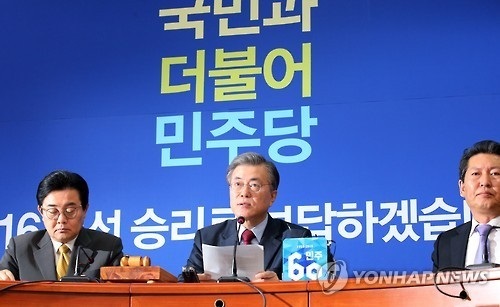The main opposition Minjoo Party of Korea on Thursday declared the results of South Korea and Japan‘s agreement on wartime sex slavery issue “invalid,” urging renegotiation and the dismissal of Foreign Minister Yun Byung-se.
The epochal agreement Monday, in which Japan apologized for victims of sexual slavery during World War II, in addition to funding a 1 billion yen ($8.3 million) project to support the surviving “comfort women.”
But the surviving victims, along with the nongovernmental organizations aiding them, have blasted the agreement for omitting Japan’s recognition of its legal responsibility for running the military brothels.

“The government sold our (Korea’s) soul for 1 billion yen. We refuse the money from such ‘disgraceful’ negotiation,” said Minjoo Party of Korea leader Rep. Moon Jae-in at the National Assembly, proposing a nationwide fund-raiser for the 1 billion yen, instead of taking the money. Moon has also argued that, as the agreement involved renunciation of a right held by the people, parliamentary preapproval was necessary based on the Constitution, thereby invalidating it.
Calling the deal “the worst diplomatic catastrophe of all time,” Moon vowed his party would cooperate with the surviving comfort women to force the Tokyo government to acknowledge its legal responsibilities and apologize for its wartime crimes.
One of the victims, Lee Yong-su, 88, called the agreement “blatant and untruthful” and vowed to fight to the end for the sake of all 283 registered victims, alive or dead. Lee and other former comfort women had expressed disappointment in the government’s failure to include legal responsibility in the agreement.
The opposition party also called for an official apology from President Park Geun-hye over the deal, and adopted a resolution calling for the foreign minister’s resignation.
The presidential office, however, reiterated that Monday’s deal was the best option possible under circumstances.
“Because the issue of comfort women is such a hurtful one, there will be regrets no matter what sort of conclusion we come to,” said Kim Sung-woo, senior Cheong Wa Dae secretary for public relations. “Manipulating the public opinion as if the government negotiation was aiming in the wrong direction will not help the surviving comfort women in any way.”
Minister Yun, on his part, sought to quell concerns by visiting the ruling Saenuri Party’s general assembly in the morning, and said that the agreement represented a “clear apology and remorse by the Shinzo Abe administration” about the comfort women issue for the first time ever. He stressed that U.S. Secretary of State John Kerry had applauded Park’s ”courage and vision,” stressing that president was the driving force behind the behind the contentious agreement.
“Some say that the government ‘rushed’ the deal, but Tokyo came up with an advanced proposal and we had to reach an agreement while 46 (victims) were still alive,” he said.
The minister also denied earlier reports that relocating the statue of a girl that represents comfort women -- currently located in front of Japanese Embassy in Seoul -- was a precondition to the provision of the 1 billion yen fund.
The mutual statement that Korea will attempt to cooperate with related organizations about “proper solution to the statue” had stoked concerns that the government will move the statue in a bid to improve the Seoul-Tokyo ties that had been less than friendly.
By Yoon Min-sik (minsikyoon@heraldcorp.com)





![[Herald Interview] 'Amid aging population, Korea to invite more young professionals from overseas'](http://res.heraldm.com/phpwas/restmb_idxmake.php?idx=644&simg=/content/image/2024/04/24/20240424050844_0.jpg&u=20240424200058)












![[KH Explains] Korean shipbuilding stocks rally: Real growth or bubble?](http://res.heraldm.com/phpwas/restmb_idxmake.php?idx=652&simg=/content/image/2024/04/25/20240425050656_0.jpg&u=)

